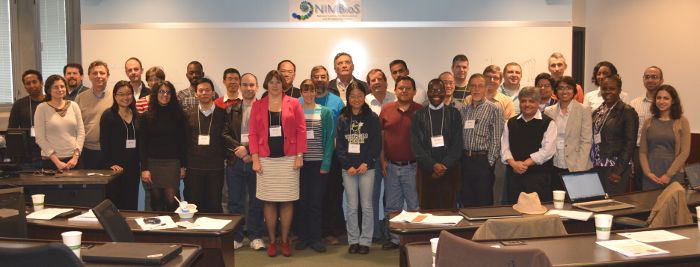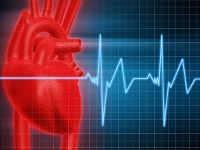| Description | Participants | Agenda | Summary | Products |
|---|
NIMBioS Investigative Workshop
Heart Rhythm Disorders

Topic: Mathematical Modeling of Heart Rhythm Disorders
Meeting dates: December 3-5, 2014
Location: NIMBioS at the University of Tennessee, Knoxville
Organizers:
Alena Talkachova, Biomedical Engineering, Univ. of Minnesota
John Wesley Cain, Mathematics and Computer Science, Univ. of Richmond, Virginia
Xiaopeng Zhao, Mechanical, Aerospace, and Biomedical Engineering, Univ. of Tennessee, Knoxville
Co-sponsored by: Institute of Biomedical Engineering (iBME), Univ. of Tennessee
Objectives: The heart is a complex nonlinear system, whose function involves the interaction between mechanical contractions of cardiac muscles and waves of electrical excitation propagating in the heart. Heartbeats are the result of the nonlinear coupling between these electrical and mechanical functions of the heart. Cardiovascular diseases, which are often associated with heart rhythm disorders, are the leading cause of death in the Western world. A complete understanding of heart rhythm disorders requires a complex system-level approach that incorporates the interaction between electrical, chemical, and mechanical activities of the heart on a variety of biological scales: ion channels to single cells to multi-cellular tissue to organ. Given the difficulty of monitoring and controlling all these factors in the lab, mathematical modeling provides a useful tool for this purpose. The goal of this workshop is to unite researchers from different disciplines – clinicians, mathematicians, physicists, biomedical engineers, and industrial practitioners – in order to better understand the existing mathematical challenges and to explore new directions in modeling of cardiovascular dynamics. As a result of the workshop, we will identify challenges and frontiers in mathematical modeling, statistics and prediction, dynamics and control, stability analysis, as well as data acquisition and analysis for heart rhythm related diseases. We will also foster new interdisciplinary collaborations.
Heart Rhythm Disorders WordPress Site
Presentations were available for viewing via live streaming during the workshop.
Playlist of online videos
![]()
 Summary Report.
This workshop reviewed models and mechanisms on spatiotemporal dynamics of cardiac arrhythmias, where a particular focus was on onset, prediction, as well as control of cardiac alternans. Alternans is a harbinger of ventricular fibrillation, the leading cause of death in the US. The workshop also reviewed techniques on multiscale nonlinear dynamics analysis of heart rate variability and those on characterization of surface ECG for fibrillation therapy and management. Discussions were organized into three subjects: 1) mathematical modeling of cardiac electrophysiology; 2) control of cardiac arrhythmias; and 3) clinical needs and applications of modeling and analysis tools.
Summary Report.
This workshop reviewed models and mechanisms on spatiotemporal dynamics of cardiac arrhythmias, where a particular focus was on onset, prediction, as well as control of cardiac alternans. Alternans is a harbinger of ventricular fibrillation, the leading cause of death in the US. The workshop also reviewed techniques on multiscale nonlinear dynamics analysis of heart rate variability and those on characterization of surface ECG for fibrillation therapy and management. Discussions were organized into three subjects: 1) mathematical modeling of cardiac electrophysiology; 2) control of cardiac arrhythmias; and 3) clinical needs and applications of modeling and analysis tools.
Products
Publications
Gao J, Hu J, Liu F, Cao Y. 2015. Multiscale entropy analysis of biological signals: a fundamental bi-scaling law. Frontiers in Computational Neuroscience.[Online]
Garzón A, Grigoriev RO. 2017. Memory effects, transient growth, and wave breakup in a model of paced atrium. Chaos: An Interdisciplinary Journal of Nonlinear Science 27(9): 093917. [Online]
NIMBioS Investigative Workshops focus on broad topics or a set of related topics, summarizing/synthesizing the state of the art and identifying future directions. Workshops have up to 35 participants. Organizers and key invited researchers make up half the participants; the remaining participants are filled through open application from the scientific community. Open applicants selected to attend are notified by NIMBioS within two weeks of the application deadline. Investigative Workshops have the potential for leading to one or more future Working Groups. Individuals with a strong interest in the topic, including post-docs and graduate students, are encouraged to apply. If needed, NIMBioS can provide support (travel, meals, lodging) for Workshop attendees, whether from a non-profit or for-profit organization.
A goal of NIMBioS is to enhance the cadre of researchers capable of interdisciplinary efforts across mathematics and biology. As part of this goal, NIMBioS is committed to promoting diversity in all its activities. Diversity is considered in all its aspects, social and scientific, including gender, ethnicity, scientific field, career stage, geography and type of home institution. Questions regarding diversity issues should be directed to diversity@nimbios.org. You can read more about our Diversity Plan on our NIMBioS Policies web page. The NIMBioS building is fully handicapped accessible.
NIMBioS
1122 Volunteer Blvd., Suite 106
University of Tennessee
Knoxville,
TN 37996-3410
PH: (865) 974-9334
FAX: (865) 974-9461
Contact NIMBioS


